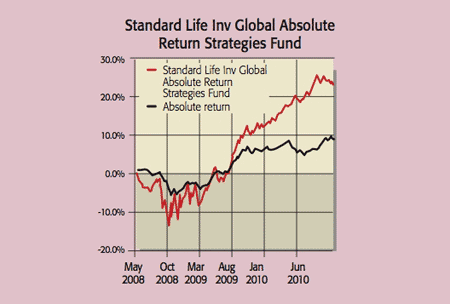
Investors are constantly hunting for the holy grail – an investment that performs in the good times, but doesn’t implode in the bad. For several years absolute-return funds have promised to do just that. By using sophisticated investment techniques such as shorting (betting on falling prices), many attempt to profit from both rising and falling markets. And rather than promising stellar growth, they typically offer steady ‘absolute’ returns above the rate you would earn on say cash. The flipside is your capital should be shielded from big falls. But are these funds actually delivering on their promise?
New research from financial advisers AWD Chase de Vere suggests not. When stockmarkets fall, most absolute-return funds fall too, although not to the same extent as the general market. And in good times the funds produce a very muted rise. Sound familiar? “It appears that absolute return funds are effectively a more cautious version of cautious managed funds,” says Patrick Connolly of AWD.
That may not seem like a bad thing, but there is one big drawback to buying absolute-return funds – they charge an enormous sum for their often low-key performance. Most funds charge a standard 1.5% annual fee plus a 10-20% fee if they make a positive return above a specified benchmark.
This means investors can lose a huge chunk of any profits in fees. This is tantamount to daylight robbery, says Justin Modray, of advisory firm CandidMoney.com. “A performance fee might be all right if managers charge less during periods of underperformance, but they charge the same regardless – it’s basic greed.”
So what else can you do?
If you want to operate a low-risk portfolio, but avoid the fees attached to absolute-return funds, then Connolly recommends investing in a combination of cash and equities. Opt for an index tracker fund, such as the F&C FTSE All-Share Tracker fund (tel: 020-7628 8000) using, say, half of your money. The other half you keep in cash that is protected when the market falls.
However, there is one argument for investing in an absolute-return fund. “For me, they are in my portfolio as an insurance policy in case markets turn very stormy,” says Mark Dampier of Hargreaves Lansdown. But some are better than others. The Standard Life Global Absolute Return fund (tel: 0131-245 2390) is a “successful” fund, says Ellen Kelleher in the Financial Times. This multi-manager fund has returned 10% over the past year. Better still, it doesn’t charge a performance fee.